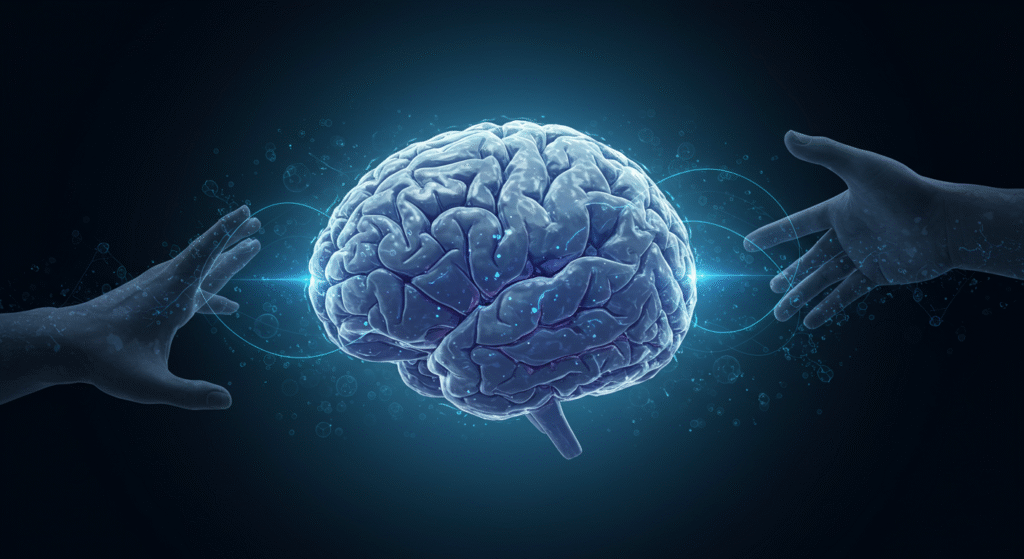Maintaining mental clarity and emotional balance is essential in a world filled with distractions and challenges. By understanding Neuroscience & Brain Health how neuroscience works and adopting natural practices, you can support a healthier, sharper mind and a more stable emotional state. This guide explores actionable strategies and insights to empower your brain health and emotional well-being.
Table of Contents
- The Connection Between Neuroscience and Brain Health
- Why Mental Clarity Matters for Everyday Life
- Neuroscience-Based Natural Practices for Emotional Balance
- Superfoods to Support Brain Health
- The Role of Sleep in Mental and Emotional Well-being
- Mindfulness and Meditation for Emotional Stability
- Exercise as a Natural Brain Booster
- Managing Stress to Protect Your Brain
- Building Habits for Consistent Mental Clarity
- FAQs on Brain Health and Emotional Balance
The Connection Between Neuroscience & Brain Health
Neuroscience & Brain Health is the study of how the brain and nervous system function. This field offers profound insights into maintaining and improving brain health.
- Your brain is a dynamic organ capable of adapting and changing throughout your life, a process known as neuroplasticity.
- Neuroplasticity enables your brain to form new pathways, essential for learning, memory, and recovery.
- Chronic stress, poor lifestyle choices, and aging can disrupt these pathways, leading to mental fog and emotional instability.
- Neuroscience reveals that optimizing neurotransmitter balance—such as dopamine or serotonin—directly impacts mood and focus.
- Understanding the brain’s reward system can help you rewire unhealthy habits into productive behaviors.
- Cognitive decline is not just a genetic inevitability; lifestyle interventions can prevent or slow down its progress.
- Techniques rooted in neuroscience, such as cognitive behavioral therapy, demonstrate how thoughts influence brain chemistry.
- Studies affirm the brain’s reliance on essential nutrients like omega-3 fatty acids and antioxidants.
- Awareness of brain mechanisms empowers individuals to make informed decisions supporting mental clarity.
- Modern neuroscience underscores the importance of proactive, natural methods to boost emotional health.
By leveraging Neuroscience & Brain Health:, you can transform your brain health through sustainable lifestyle changes.
Why Mental Clarity Matters for Everyday Life
Mental clarity ensures you think clearly, make sound decisions, and respond effectively to everyday situations. It impacts both personal and professional success.
- Mental clarity plays a key role in maintaining focus during complex tasks or projects.
- It reduces impulsive decision-making by promoting rational thought processes.
- A sharp mind ensures productive communication in relationships and work environments.
- Lack of clarity often leads to stress, burnout, or missed opportunities.
- With clear thinking, you can plan and execute your goals more effectively.
- Neuroscience indicates that mental fog weakens brain processing speed and accuracy.
- A foggy mind often signals underlying issues like poor sleep, dehydration, or nutrient deficiencies.
- People with mental clarity experience higher levels of creativity and problem-solving ability.
- Clear thinking reduces overthinking tendencies, leading to emotional peace.
- Enhancing mental clarity requires simple shifts like better hydration, rest, and focus exercises.
- Balanced neurotransmitter levels, such as acetylcholine, are associated with improved attention span.
- A well-functioning brain enables quick learning of new skills and adapting to changing situations.
- Tools for mental clarity, such as journaling or minimalism, align with neuroscience principles.
- Clarity in thought unlocks greater confidence and inner peace.
- An optimized mind supports overall personal growth and life satisfaction.
Achieving mental clarity starts with identifying cognitive disruptors and adopting structured habits.
Neuroscience-Based Natural Practices for Emotional Balance
Achieving emotional balance is rooted in regulating the nervous system and hormone levels naturally.
- Emotional balance requires a harmonious interaction between the brain’s limbic system and prefrontal cortex.
- The vagus nerve plays a key role in managing stress and emotional regulation, as supported by neuroscience.
- Deep breathing practices stimulate the vagus nerve, enhancing calmness.
- Gratitude has been shown to increase dopamine activity, directly elevating mood.
- Social connection fosters the release of oxytocin, which promotes trust and well-being.
- Spending time in nature lowers stress hormones like cortisol, stabilizing emotions.
- Neurofeedback therapy trains the brain to self-regulate, reducing anxiety or depression.
- Aromatherapy with essential oils—such as lavender—activates calming brain pathways.
- Avoiding overstimulation (e.g., excessive screen time) balances the parasympathetic nervous system.
- Aerobic exercises increase endorphins, reducing symptoms of sadness or low energy.
- Neuroscience recommends alternating focus and rest to avoid mental exhaustion.
- Eating whole foods supports stable blood sugar, reducing mood swings.
- Controlled exposure to sunlight boosts serotonin, enhancing positivity.
- Journaling your thoughts can declutter the mind, fostering emotional insight.
- Neuroscience-backed techniques ensure behavioral changes benefit emotional stability holistically.
By incorporating these natural practices, you promote both resilience and balance in everyday life.
Superfoods to Support Neuroscience & Brain Health:
Integrating brain-boosting foods into your diet can profoundly enhance cognitive function and emotional balance.
| Superfood | Key Nutrients | Brain Benefits |
|---|---|---|
| Blueberries | Antioxidants | Protect against oxidative stress, boost memory. |
| Salmon | Omega-3 fatty acids | Support brain-cell communication. |
| Turmeric | Curcumin | Enhances neuroplasticity and reduces inflammation. |
| Dark chocolate | Flavonoids | Improves blood flow to the brain. |
| Walnuts | Vitamin E | Protect brains from cognitive decline. |
- Blueberries enhance memory and protect the brain against stress.
- Fatty fish, like salmon, fuels the brain with necessary omega-3s for smooth communication between neurons.
- Turmeric contains powerful anti-inflammatory properties, reducing symptoms of brain fog.
- Antioxidants in dark chocolate enhance focus and cognitive performance.
- Walnuts, rich in vitamin E, slow age-related cognitive decline naturally.
- Leafy greens contain vitamin K, vital for forming brain cell membranes.
- Pumpkin seeds offer magnesium, calming the brain and reducing stress.
- Broccoli is packed with choline, a compound essential for neurotransmitter production.
- Ground flaxseed is a rich fiber source, critical for stabilizing mood-related hormones.
- Green tea contains L-theanine, promoting relaxation while enhancing alertness.
A balanced diet integrating these foods directly supports peak brain performance and mood regulation.
The Role of Sleep in Mental and Emotional Well-being
Sleep is a fundamental pillar of mental and emotional health for Neuroscience & Brain Health:, playing a critical role in cognitive function, emotional regulation, and overall brain health.
During sleep, the brain consolidates memories, processes emotions, and clears out toxins that build up throughout the day.
Insufficient sleep has been linked to heightened stress levels, difficulty concentrating, and increased risk of anxiety and depression.
Quality sleep also helps maintain hormone balance, like cortisol and serotonin, which are essential for stable moods.
Creating a consistent sleep schedule and fostering good sleep hygiene, such as limiting screen time before bed and ensuring a comfortable sleeping environment, is vital for optimizing mental and emotional well-being.
Prioritizing sleep is not just about rest but about giving the brain the recovery time it needs to function at its best.
Mindfulness and Meditation for Emotional Stability for Neuroscience & Brain Health:
- Reduces Stress and Anxiety
Practicing mindfulness and meditation helps lower cortisol levels, the stress hormone, leading to a calmer state of mind. Regular sessions improve the ability to manage anxiety and respond to stressful situations with clarity and composure.
- Enhances Emotional Regulation
Meditation fosters self-awareness, which is essential for recognizing and managing emotions effectively. By understanding emotional triggers, individuals are better equipped to respond in healthy and constructive ways.
- Improves Focus and Concentration
Mindfulness exercises train the brain to stay present in the moment, which can enhance concentration and reduce mental distractions. This focused state is vital for both personal and professional tasks.
- Promotes Better Sleep Quality
Guided meditations before bedtime can help relax the mind, making it easier to fall and stay asleep. A well-rested mind is more resilient and capable of handling emotional challenges.
- Builds Resilience to Negative Thoughts
Mindfulness supports a non-judgmental approach to emotions, allowing individuals to observe their thoughts without overreacting or becoming overwhelmed. This approach strengthens the ability to withstand negative thinking patterns.
- Encourages a Positive Outlook on Life
Practicing mindfulness regularly fosters gratitude and assists in recognizing the small joys in daily life. By focusing on the present moment, individuals can reduce feelings of regret about the past or anxiety about the future. Over time, this shift in perspective nurtures an optimistic mindset, enhancing overall well-being. Additionally, mindfulness can help cultivate compassion and kindness, not only toward others but also toward oneself, further reinforcing a positive and balanced outlook.
Daily meditation can help cultivate gratitude and positivity, leading to a more balanced emotional state and improved overall well-being.
Exercise as a Natural Brain Booster
- Enhances Cognitive Function: Regular physical activity stimulates the production of chemicals that improve brain function, including memory, learning, and concentration. It also promotes the growth of new brain cells through a process called neurogenesis, particularly in the hippocampus, which is involved in memory and learning.
- Reduces Stress and Anxiety: Exercise reduces the level of stress hormones like cortisol and increases the production of endorphins, often referred to as “feel-good” hormones. This natural stress relief enhances mental clarity and emotional stability.
- Improves Sleep Quality: Physical activity helps regulate sleep patterns by increasing the time spent in deep and restorative phases of sleep. Quality sleep, in turn, enhances focus, problem-solving abilities, and overall mental functioning during the day.
- Boosts Creativity and Productivity: Studies have shown that aerobic exercise can increase creativity and improve problem-solving skills. The release of endorphins and enhanced circulation to the brain during exercise create ideal conditions for creative thinking.
- Protects Against Cognitive Decline: Regular exercise supports long-term brain health by reducing the risk of neurodegenerative diseases like Alzheimer’s and dementia. It fosters better blood flow to the brain and reduces inflammation, helping to preserve cognitive abilities as we age.
Managing Stress to Protect Your Brain
Stress can have a significant impact on Neuroscience & Brain Health:, which is why managing it effectively is crucial. Here are some strategies to reduce stress and protect your brain:
- Practice Mindfulness and Meditation: Regular mindfulness or meditation practices can help reduce stress hormones and improve emotional regulation. These techniques promote a sense of calm and allow the brain to focus better.
- Engage in Physical Activity: Exercise not only combats stress by releasing endorphins but also boosts overall mental resilience. Activities such as yoga or walking in nature are particularly effective for stress management.
- Prioritize Sleep: Stress and poor sleep often go hand in hand. Ensuring you get enough restorative sleep helps the brain process emotions and reduces feelings of anxiety.
- Build Healthy Relationships: Strong social connections can act as a buffer against stress. Spend time with friends and family to foster a sense of belonging and emotional support.
- Practice Time Management: Overwhelm from a packed schedule can lead to chronic stress. By managing your time effectively and setting realistic goals, you can alleviate unnecessary pressure.
- Limit Screen Time: Excessive time on devices, particularly before bed, can increase stress and disrupt sleep. Take regular breaks and focus on offline activities to support brain health.
- Eat a Balanced Diet: Consuming nutrient-rich foods, such as those high in antioxidants, omega-3s, and fiber, can help reduce inflammation caused by chronic stress and support brain function.
By incorporating these practices, managing stress becomes more achievable, ensuring better protection for your brain health over time.
Building Habits for Consistent Mental Clarity
- Practice Mindfulness Daily: Dedicate a few minutes each day to mindfulness or meditation. This helps reduce anxiety, enhance focus, and foster emotional resilience. Simple practices like deep breathing or guided meditation apps can be highly effective.
- Establish a Regular Sleep Schedule: Prioritize consistent sleep by going to bed and waking up at the same time each day. Quality sleep improves cognitive function, memory consolidation, and emotional regulation.
- Limit Overwhelm with Time Management: Break larger tasks into manageable steps and prioritize your responsibilities. Tools like planners or digital organization apps can help you stay on track without feeling overwhelmed.
- Stay Physically Active: Regular exercise boosts endorphins, reduces stress, and improves overall mental clarity. Even light physical activity, such as a short walk or yoga, can make a significant difference.
- Hydrate and Snack Smartly: Dehydration and poor eating habits can hinder brain performance. Keep water nearby throughout the day and choose snacks like nuts, fresh fruits, or dark chocolate to maintain your energy and focus.
- Limit Multitasking: Focus on one task at a time to improve efficiency and reduce mental fatigue. Single-tasking allows your brain to allocate focused effort, ensuring clarity and quality in your work.
By nurturing these habits, you can enhance your mental clarity and maintain a more balanced and productive state of mind.
FAQs on Brain Health and Emotional Balance
- How much sleep is necessary for optimal brain function?
Adults typically need 7-9 hours of high-quality sleep per night to support brain function and emotional balance. Sleep aids in memory consolidation, cognitive processing, and emotional regulation.
- Can diet impact emotional well-being?
Yes, your diet plays a significant role in your emotional and mental health. Foods rich in omega-3 fatty acids, antioxidants, and vitamins—such as fish, leafy greens, and berries—can boost mood and cognitive function. Avoid excessive sugar or processed foods, as they may contribute to mood swings or mental fog.
- How does physical exercise affect brain health?
Regular physical activity enhances blood flow to the brain, promoting the growth of new neurons and reducing the risk of cognitive decline. Exercise also triggers the release of endorphins, improving mood and reducing stress.
- What is the role of mindfulness in maintaining emotional balance?
Practicing mindfulness can help reduce stress, enhance focus, and regulate emotions. Techniques like meditation or deep breathing exercises increase self-awareness and promote a calmer mental state.
- Are there specific habits that help prevent mental fatigue?
Yes, habits such as taking regular breaks, maintaining proper hydration, practicing gratitude, and stepping away from screens periodically can help recharge your mind and improve mental clarity.
- Can social connections improve brain and emotional health?
Strong social interactions foster a sense of belonging and reduce feelings of loneliness, which positively impacts mental health. Engaging in meaningful conversations also helps stimulate cognitive functioning.
- What role does physical exercise play in mental health?
Physical exercise releases endorphins, often referred to as “feel-good” hormones, which help reduce stress, anxiety, and depression. Regular activity also enhances sleep quality and boosts overall mood.
- Can mindfulness practices benefit mental well-being?
Yes, mindfulness practices such as meditation and deep breathing can reduce stress and promote emotional balance. These techniques encourage present-moment awareness, helping to calm an overactive mind.










